Construction Law 1 Report: Breach of Contract Case Study
VerifiedAdded on 2023/05/27
|13
|4022
|175
Report
AI Summary
This report analyzes a construction law case concerning a stadium construction project in the Kingdom of Sautar. Delivery Force Ltd (DF) contracted to build the stadium, sourcing seats from ParkSeat Ltd (PS) through Qatarplast (QP). Due to unforeseen circumstances, including a factory fire and economic restrictions, both DF and QP faced breaches of contract. The report examines the legal provisions under UK contract law, specifically the Sales of Goods Act 1994, and principles of damages. It explores the concepts of repudiatory breach, force majeure, and remoteness of damages, evaluating the client's and DF's rights to claim damages. The analysis considers the impact of timely performance, the nature of breaches, and the application of cumulative remedies, providing a detailed assessment of the contractual obligations and potential liabilities of each party involved.
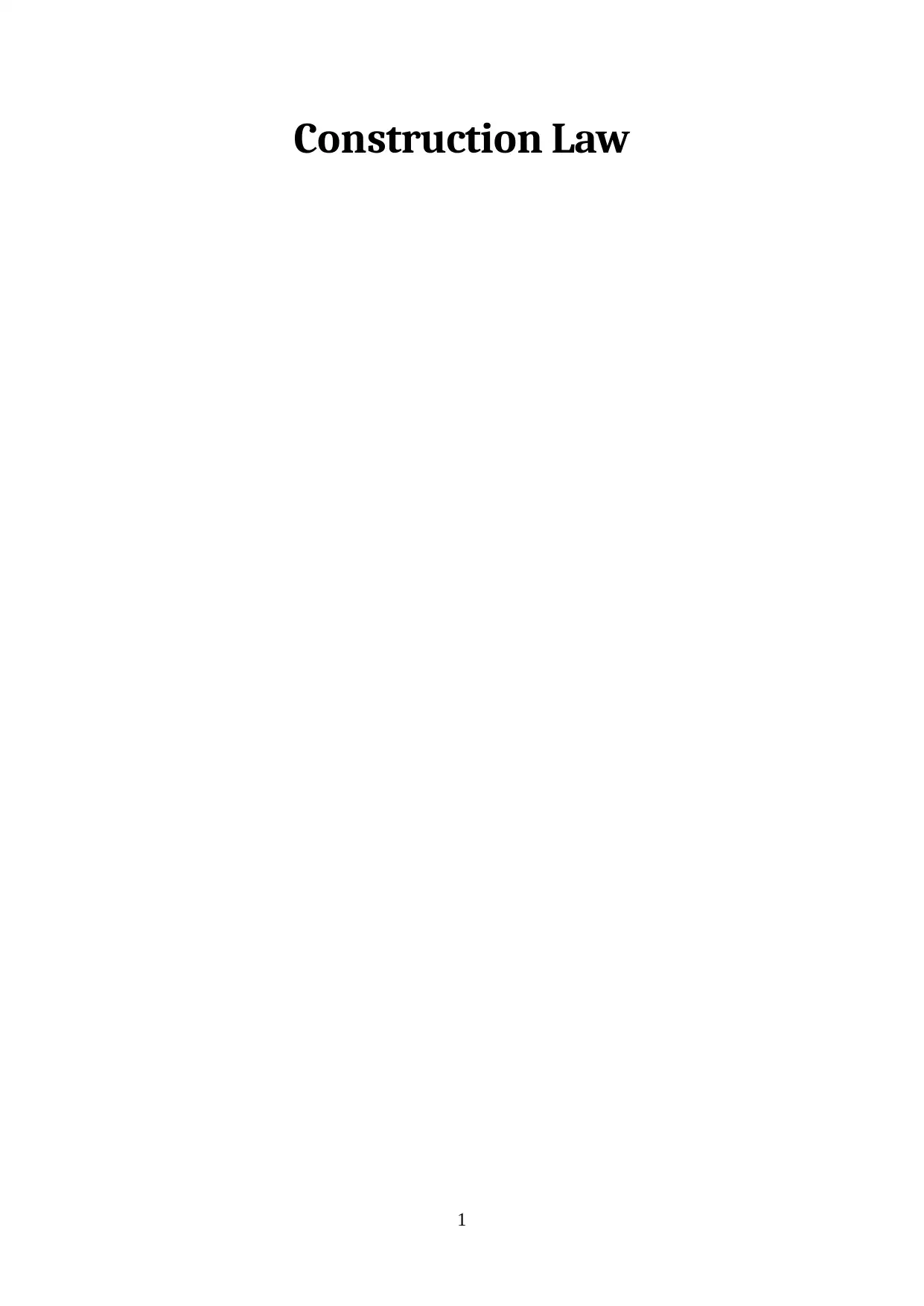
Construction Law
1
1
Paraphrase This Document
Need a fresh take? Get an instant paraphrase of this document with our AI Paraphraser
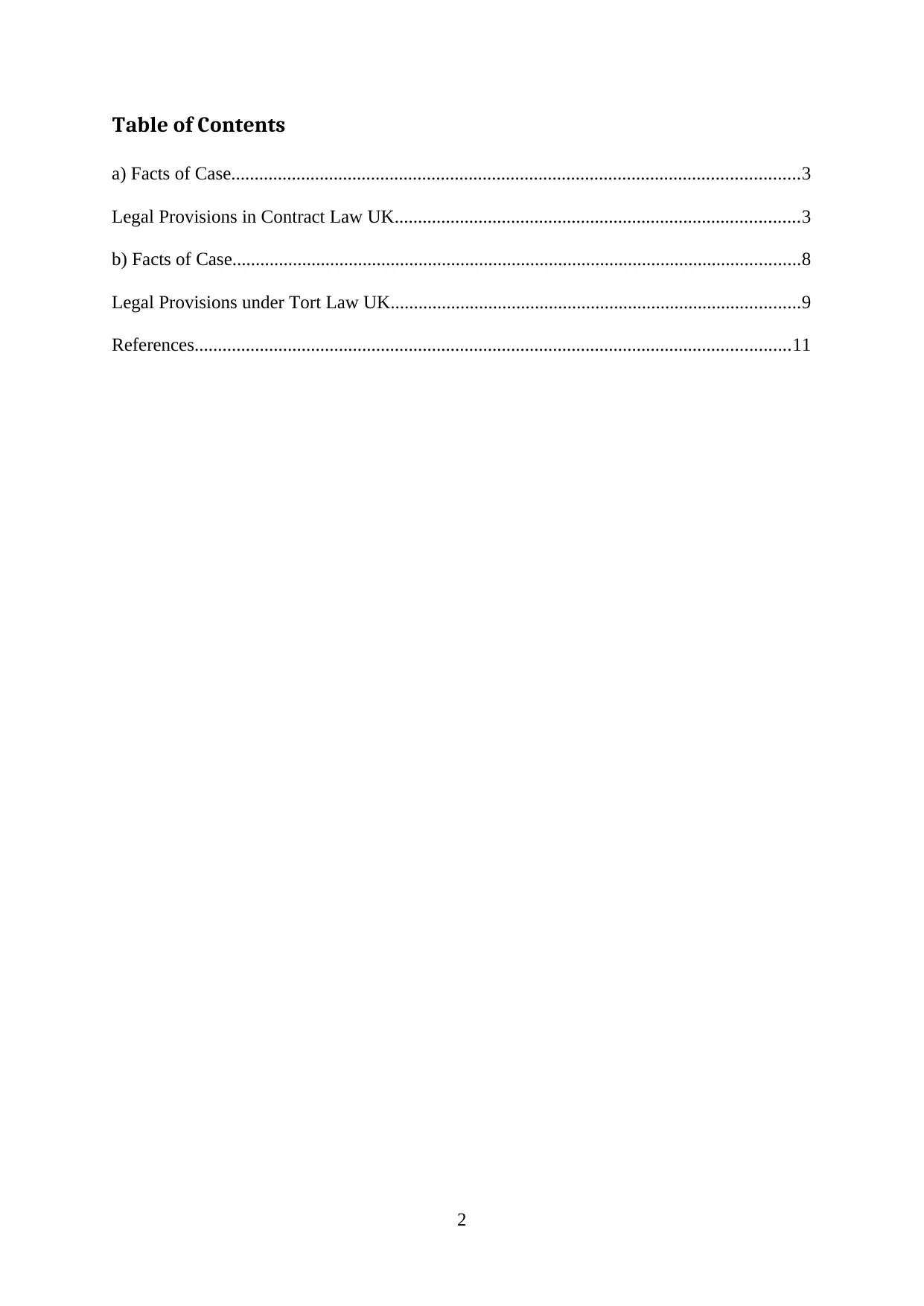
Table of Contents
a) Facts of Case..........................................................................................................................3
Legal Provisions in Contract Law UK.......................................................................................3
b) Facts of Case..........................................................................................................................8
Legal Provisions under Tort Law UK........................................................................................9
References................................................................................................................................11
2
a) Facts of Case..........................................................................................................................3
Legal Provisions in Contract Law UK.......................................................................................3
b) Facts of Case..........................................................................................................................8
Legal Provisions under Tort Law UK........................................................................................9
References................................................................................................................................11
2
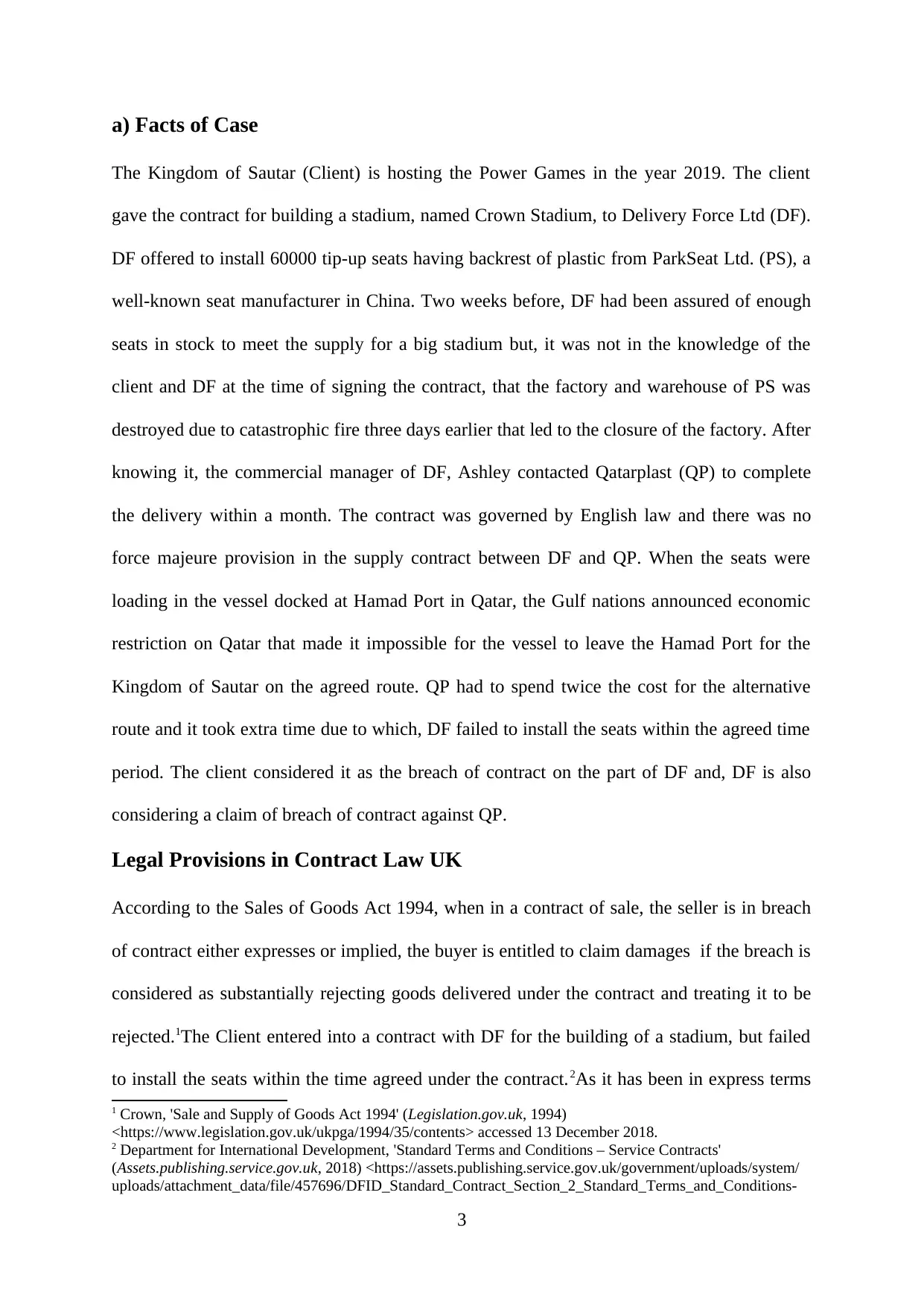
a) Facts of Case
The Kingdom of Sautar (Client) is hosting the Power Games in the year 2019. The client
gave the contract for building a stadium, named Crown Stadium, to Delivery Force Ltd (DF).
DF offered to install 60000 tip-up seats having backrest of plastic from ParkSeat Ltd. (PS), a
well-known seat manufacturer in China. Two weeks before, DF had been assured of enough
seats in stock to meet the supply for a big stadium but, it was not in the knowledge of the
client and DF at the time of signing the contract, that the factory and warehouse of PS was
destroyed due to catastrophic fire three days earlier that led to the closure of the factory. After
knowing it, the commercial manager of DF, Ashley contacted Qatarplast (QP) to complete
the delivery within a month. The contract was governed by English law and there was no
force majeure provision in the supply contract between DF and QP. When the seats were
loading in the vessel docked at Hamad Port in Qatar, the Gulf nations announced economic
restriction on Qatar that made it impossible for the vessel to leave the Hamad Port for the
Kingdom of Sautar on the agreed route. QP had to spend twice the cost for the alternative
route and it took extra time due to which, DF failed to install the seats within the agreed time
period. The client considered it as the breach of contract on the part of DF and, DF is also
considering a claim of breach of contract against QP.
Legal Provisions in Contract Law UK
According to the Sales of Goods Act 1994, when in a contract of sale, the seller is in breach
of contract either expresses or implied, the buyer is entitled to claim damages if the breach is
considered as substantially rejecting goods delivered under the contract and treating it to be
rejected.1The Client entered into a contract with DF for the building of a stadium, but failed
to install the seats within the time agreed under the contract.2As it has been in express terms
1 Crown, 'Sale and Supply of Goods Act 1994' (Legislation.gov.uk, 1994)
<https://www.legislation.gov.uk/ukpga/1994/35/contents> accessed 13 December 2018.
2 Department for International Development, 'Standard Terms and Conditions – Service Contracts'
(Assets.publishing.service.gov.uk, 2018) <https://assets.publishing.service.gov.uk/government/uploads/system/
uploads/attachment_data/file/457696/DFID_Standard_Contract_Section_2_Standard_Terms_and_Conditions-
3
The Kingdom of Sautar (Client) is hosting the Power Games in the year 2019. The client
gave the contract for building a stadium, named Crown Stadium, to Delivery Force Ltd (DF).
DF offered to install 60000 tip-up seats having backrest of plastic from ParkSeat Ltd. (PS), a
well-known seat manufacturer in China. Two weeks before, DF had been assured of enough
seats in stock to meet the supply for a big stadium but, it was not in the knowledge of the
client and DF at the time of signing the contract, that the factory and warehouse of PS was
destroyed due to catastrophic fire three days earlier that led to the closure of the factory. After
knowing it, the commercial manager of DF, Ashley contacted Qatarplast (QP) to complete
the delivery within a month. The contract was governed by English law and there was no
force majeure provision in the supply contract between DF and QP. When the seats were
loading in the vessel docked at Hamad Port in Qatar, the Gulf nations announced economic
restriction on Qatar that made it impossible for the vessel to leave the Hamad Port for the
Kingdom of Sautar on the agreed route. QP had to spend twice the cost for the alternative
route and it took extra time due to which, DF failed to install the seats within the agreed time
period. The client considered it as the breach of contract on the part of DF and, DF is also
considering a claim of breach of contract against QP.
Legal Provisions in Contract Law UK
According to the Sales of Goods Act 1994, when in a contract of sale, the seller is in breach
of contract either expresses or implied, the buyer is entitled to claim damages if the breach is
considered as substantially rejecting goods delivered under the contract and treating it to be
rejected.1The Client entered into a contract with DF for the building of a stadium, but failed
to install the seats within the time agreed under the contract.2As it has been in express terms
1 Crown, 'Sale and Supply of Goods Act 1994' (Legislation.gov.uk, 1994)
<https://www.legislation.gov.uk/ukpga/1994/35/contents> accessed 13 December 2018.
2 Department for International Development, 'Standard Terms and Conditions – Service Contracts'
(Assets.publishing.service.gov.uk, 2018) <https://assets.publishing.service.gov.uk/government/uploads/system/
uploads/attachment_data/file/457696/DFID_Standard_Contract_Section_2_Standard_Terms_and_Conditions-
3
⊘ This is a preview!⊘
Do you want full access?
Subscribe today to unlock all pages.

Trusted by 1+ million students worldwide
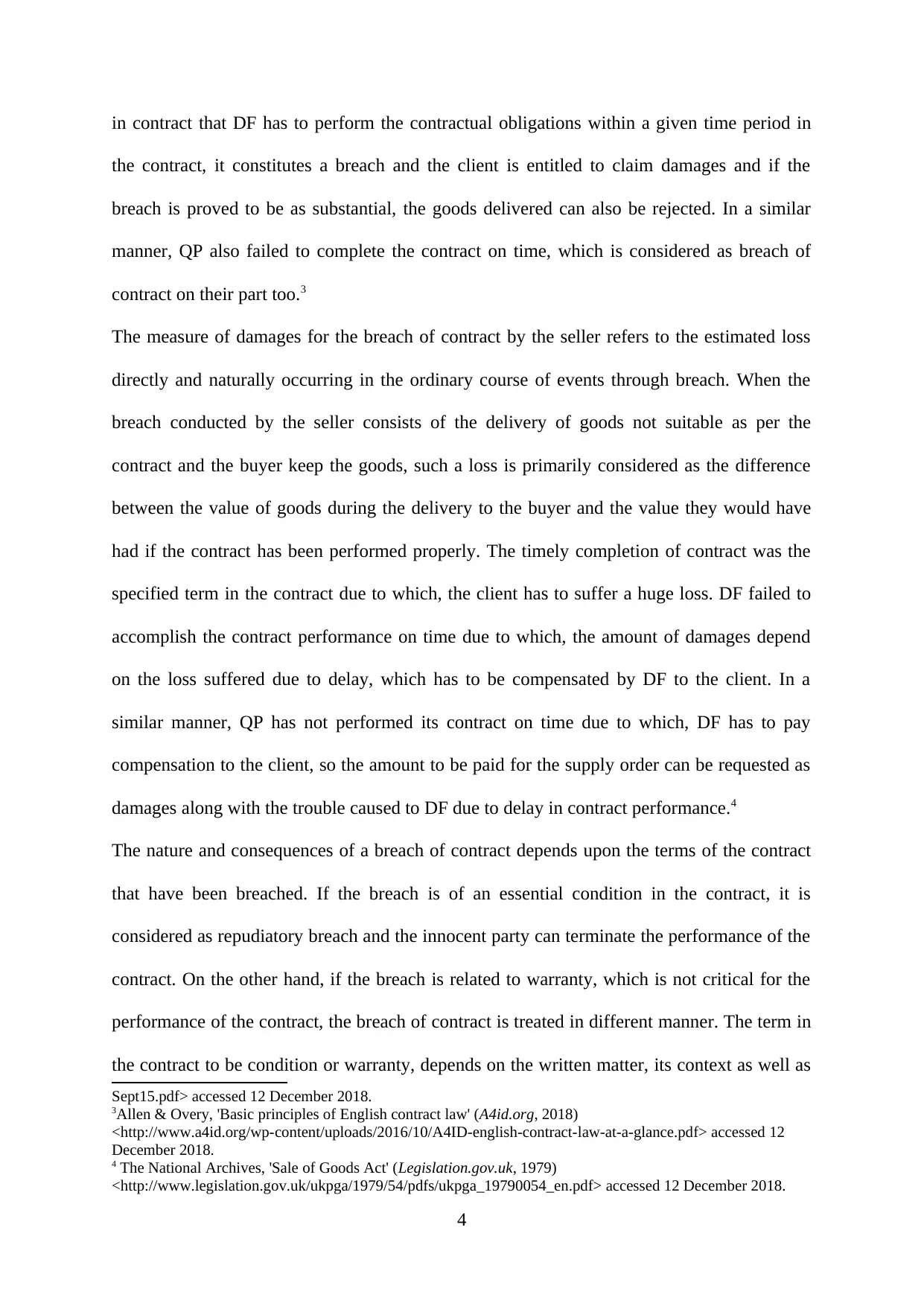
in contract that DF has to perform the contractual obligations within a given time period in
the contract, it constitutes a breach and the client is entitled to claim damages and if the
breach is proved to be as substantial, the goods delivered can also be rejected. In a similar
manner, QP also failed to complete the contract on time, which is considered as breach of
contract on their part too.3
The measure of damages for the breach of contract by the seller refers to the estimated loss
directly and naturally occurring in the ordinary course of events through breach. When the
breach conducted by the seller consists of the delivery of goods not suitable as per the
contract and the buyer keep the goods, such a loss is primarily considered as the difference
between the value of goods during the delivery to the buyer and the value they would have
had if the contract has been performed properly. The timely completion of contract was the
specified term in the contract due to which, the client has to suffer a huge loss. DF failed to
accomplish the contract performance on time due to which, the amount of damages depend
on the loss suffered due to delay, which has to be compensated by DF to the client. In a
similar manner, QP has not performed its contract on time due to which, DF has to pay
compensation to the client, so the amount to be paid for the supply order can be requested as
damages along with the trouble caused to DF due to delay in contract performance.4
The nature and consequences of a breach of contract depends upon the terms of the contract
that have been breached. If the breach is of an essential condition in the contract, it is
considered as repudiatory breach and the innocent party can terminate the performance of the
contract. On the other hand, if the breach is related to warranty, which is not critical for the
performance of the contract, the breach of contract is treated in different manner. The term in
the contract to be condition or warranty, depends on the written matter, its context as well as
Sept15.pdf> accessed 12 December 2018.
3Allen & Overy, 'Basic principles of English contract law' (A4id.org, 2018)
<http://www.a4id.org/wp-content/uploads/2016/10/A4ID-english-contract-law-at-a-glance.pdf> accessed 12
December 2018.
4 The National Archives, 'Sale of Goods Act' (Legislation.gov.uk, 1979)
<http://www.legislation.gov.uk/ukpga/1979/54/pdfs/ukpga_19790054_en.pdf> accessed 12 December 2018.
4
the contract, it constitutes a breach and the client is entitled to claim damages and if the
breach is proved to be as substantial, the goods delivered can also be rejected. In a similar
manner, QP also failed to complete the contract on time, which is considered as breach of
contract on their part too.3
The measure of damages for the breach of contract by the seller refers to the estimated loss
directly and naturally occurring in the ordinary course of events through breach. When the
breach conducted by the seller consists of the delivery of goods not suitable as per the
contract and the buyer keep the goods, such a loss is primarily considered as the difference
between the value of goods during the delivery to the buyer and the value they would have
had if the contract has been performed properly. The timely completion of contract was the
specified term in the contract due to which, the client has to suffer a huge loss. DF failed to
accomplish the contract performance on time due to which, the amount of damages depend
on the loss suffered due to delay, which has to be compensated by DF to the client. In a
similar manner, QP has not performed its contract on time due to which, DF has to pay
compensation to the client, so the amount to be paid for the supply order can be requested as
damages along with the trouble caused to DF due to delay in contract performance.4
The nature and consequences of a breach of contract depends upon the terms of the contract
that have been breached. If the breach is of an essential condition in the contract, it is
considered as repudiatory breach and the innocent party can terminate the performance of the
contract. On the other hand, if the breach is related to warranty, which is not critical for the
performance of the contract, the breach of contract is treated in different manner. The term in
the contract to be condition or warranty, depends on the written matter, its context as well as
Sept15.pdf> accessed 12 December 2018.
3Allen & Overy, 'Basic principles of English contract law' (A4id.org, 2018)
<http://www.a4id.org/wp-content/uploads/2016/10/A4ID-english-contract-law-at-a-glance.pdf> accessed 12
December 2018.
4 The National Archives, 'Sale of Goods Act' (Legislation.gov.uk, 1979)
<http://www.legislation.gov.uk/ukpga/1979/54/pdfs/ukpga_19790054_en.pdf> accessed 12 December 2018.
4
Paraphrase This Document
Need a fresh take? Get an instant paraphrase of this document with our AI Paraphraser
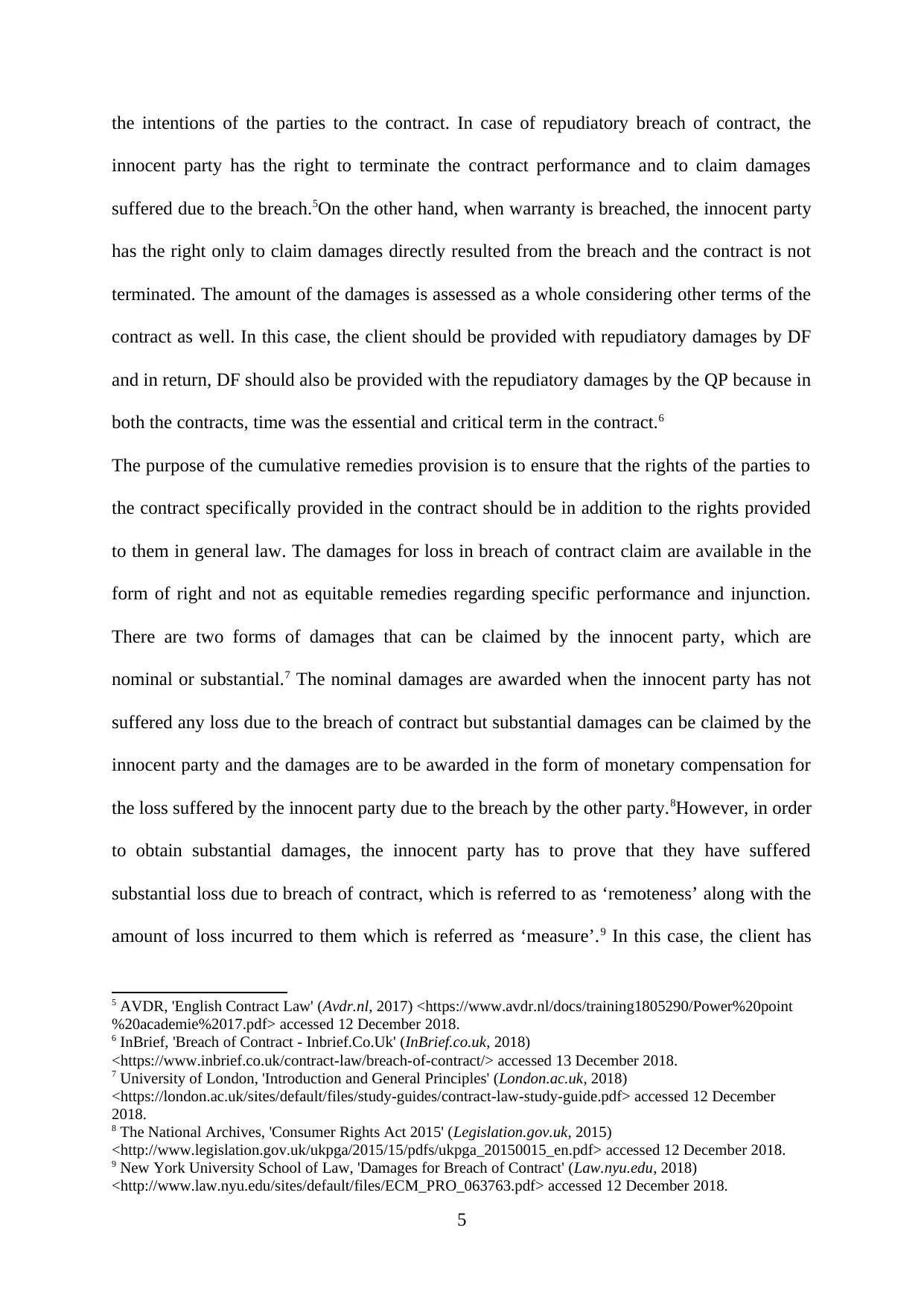
the intentions of the parties to the contract. In case of repudiatory breach of contract, the
innocent party has the right to terminate the contract performance and to claim damages
suffered due to the breach.5On the other hand, when warranty is breached, the innocent party
has the right only to claim damages directly resulted from the breach and the contract is not
terminated. The amount of the damages is assessed as a whole considering other terms of the
contract as well. In this case, the client should be provided with repudiatory damages by DF
and in return, DF should also be provided with the repudiatory damages by the QP because in
both the contracts, time was the essential and critical term in the contract.6
The purpose of the cumulative remedies provision is to ensure that the rights of the parties to
the contract specifically provided in the contract should be in addition to the rights provided
to them in general law. The damages for loss in breach of contract claim are available in the
form of right and not as equitable remedies regarding specific performance and injunction.
There are two forms of damages that can be claimed by the innocent party, which are
nominal or substantial.7 The nominal damages are awarded when the innocent party has not
suffered any loss due to the breach of contract but substantial damages can be claimed by the
innocent party and the damages are to be awarded in the form of monetary compensation for
the loss suffered by the innocent party due to the breach by the other party.8However, in order
to obtain substantial damages, the innocent party has to prove that they have suffered
substantial loss due to breach of contract, which is referred to as ‘remoteness’ along with the
amount of loss incurred to them which is referred as ‘measure’.9 In this case, the client has
5 AVDR, 'English Contract Law' (Avdr.nl, 2017) <https://www.avdr.nl/docs/training1805290/Power%20point
%20academie%2017.pdf> accessed 12 December 2018.
6 InBrief, 'Breach of Contract - Inbrief.Co.Uk' (InBrief.co.uk, 2018)
<https://www.inbrief.co.uk/contract-law/breach-of-contract/> accessed 13 December 2018.
7 University of London, 'Introduction and General Principles' (London.ac.uk, 2018)
<https://london.ac.uk/sites/default/files/study-guides/contract-law-study-guide.pdf> accessed 12 December
2018.
8 The National Archives, 'Consumer Rights Act 2015' (Legislation.gov.uk, 2015)
<http://www.legislation.gov.uk/ukpga/2015/15/pdfs/ukpga_20150015_en.pdf> accessed 12 December 2018.
9 New York University School of Law, 'Damages for Breach of Contract' (Law.nyu.edu, 2018)
<http://www.law.nyu.edu/sites/default/files/ECM_PRO_063763.pdf> accessed 12 December 2018.
5
innocent party has the right to terminate the contract performance and to claim damages
suffered due to the breach.5On the other hand, when warranty is breached, the innocent party
has the right only to claim damages directly resulted from the breach and the contract is not
terminated. The amount of the damages is assessed as a whole considering other terms of the
contract as well. In this case, the client should be provided with repudiatory damages by DF
and in return, DF should also be provided with the repudiatory damages by the QP because in
both the contracts, time was the essential and critical term in the contract.6
The purpose of the cumulative remedies provision is to ensure that the rights of the parties to
the contract specifically provided in the contract should be in addition to the rights provided
to them in general law. The damages for loss in breach of contract claim are available in the
form of right and not as equitable remedies regarding specific performance and injunction.
There are two forms of damages that can be claimed by the innocent party, which are
nominal or substantial.7 The nominal damages are awarded when the innocent party has not
suffered any loss due to the breach of contract but substantial damages can be claimed by the
innocent party and the damages are to be awarded in the form of monetary compensation for
the loss suffered by the innocent party due to the breach by the other party.8However, in order
to obtain substantial damages, the innocent party has to prove that they have suffered
substantial loss due to breach of contract, which is referred to as ‘remoteness’ along with the
amount of loss incurred to them which is referred as ‘measure’.9 In this case, the client has
5 AVDR, 'English Contract Law' (Avdr.nl, 2017) <https://www.avdr.nl/docs/training1805290/Power%20point
%20academie%2017.pdf> accessed 12 December 2018.
6 InBrief, 'Breach of Contract - Inbrief.Co.Uk' (InBrief.co.uk, 2018)
<https://www.inbrief.co.uk/contract-law/breach-of-contract/> accessed 13 December 2018.
7 University of London, 'Introduction and General Principles' (London.ac.uk, 2018)
<https://london.ac.uk/sites/default/files/study-guides/contract-law-study-guide.pdf> accessed 12 December
2018.
8 The National Archives, 'Consumer Rights Act 2015' (Legislation.gov.uk, 2015)
<http://www.legislation.gov.uk/ukpga/2015/15/pdfs/ukpga_20150015_en.pdf> accessed 12 December 2018.
9 New York University School of Law, 'Damages for Breach of Contract' (Law.nyu.edu, 2018)
<http://www.law.nyu.edu/sites/default/files/ECM_PRO_063763.pdf> accessed 12 December 2018.
5
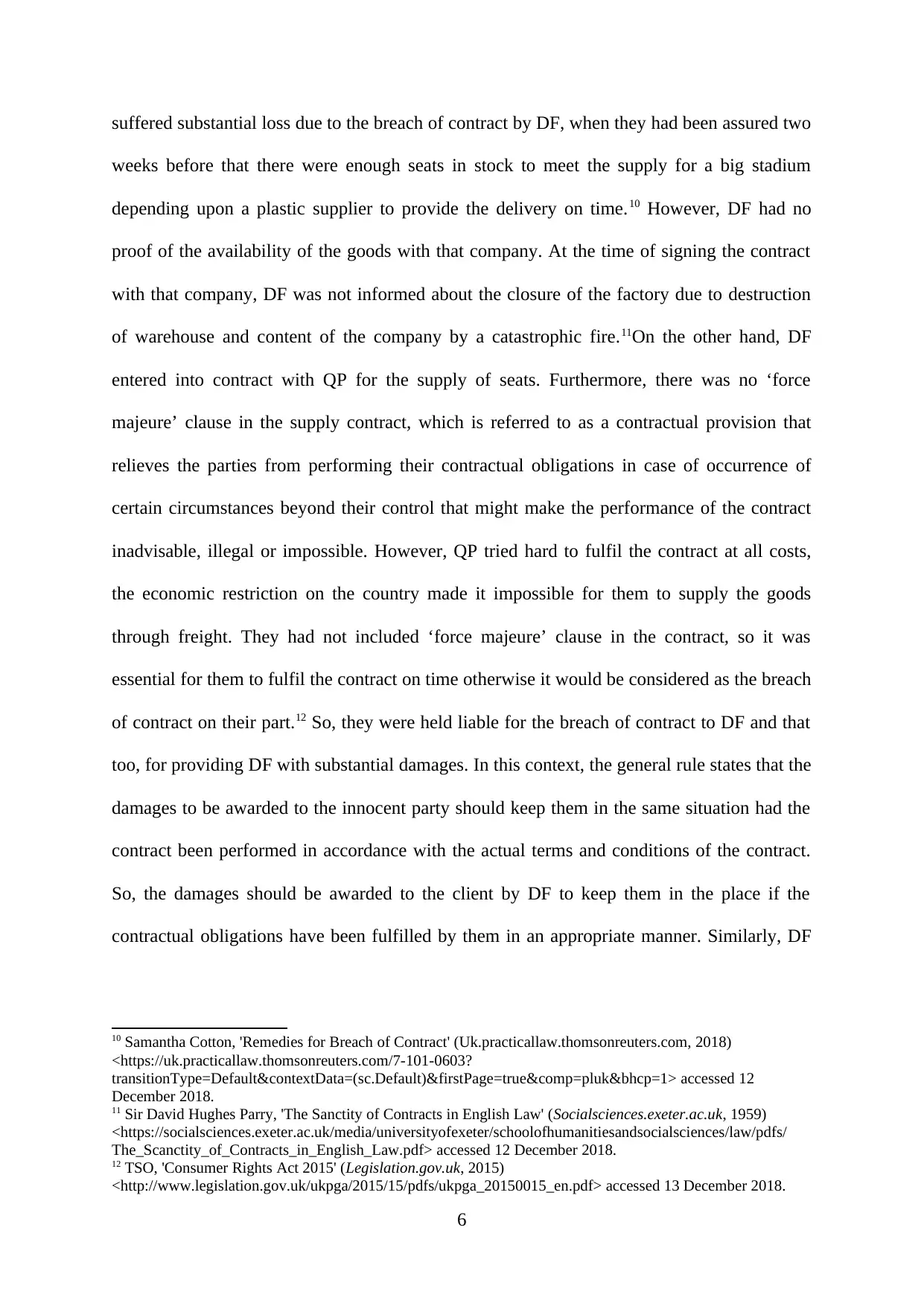
suffered substantial loss due to the breach of contract by DF, when they had been assured two
weeks before that there were enough seats in stock to meet the supply for a big stadium
depending upon a plastic supplier to provide the delivery on time.10 However, DF had no
proof of the availability of the goods with that company. At the time of signing the contract
with that company, DF was not informed about the closure of the factory due to destruction
of warehouse and content of the company by a catastrophic fire.11On the other hand, DF
entered into contract with QP for the supply of seats. Furthermore, there was no ‘force
majeure’ clause in the supply contract, which is referred to as a contractual provision that
relieves the parties from performing their contractual obligations in case of occurrence of
certain circumstances beyond their control that might make the performance of the contract
inadvisable, illegal or impossible. However, QP tried hard to fulfil the contract at all costs,
the economic restriction on the country made it impossible for them to supply the goods
through freight. They had not included ‘force majeure’ clause in the contract, so it was
essential for them to fulfil the contract on time otherwise it would be considered as the breach
of contract on their part.12 So, they were held liable for the breach of contract to DF and that
too, for providing DF with substantial damages. In this context, the general rule states that the
damages to be awarded to the innocent party should keep them in the same situation had the
contract been performed in accordance with the actual terms and conditions of the contract.
So, the damages should be awarded to the client by DF to keep them in the place if the
contractual obligations have been fulfilled by them in an appropriate manner. Similarly, DF
10 Samantha Cotton, 'Remedies for Breach of Contract' (Uk.practicallaw.thomsonreuters.com, 2018)
<https://uk.practicallaw.thomsonreuters.com/7-101-0603?
transitionType=Default&contextData=(sc.Default)&firstPage=true&comp=pluk&bhcp=1> accessed 12
December 2018.
11 Sir David Hughes Parry, 'The Sanctity of Contracts in English Law' (Socialsciences.exeter.ac.uk, 1959)
<https://socialsciences.exeter.ac.uk/media/universityofexeter/schoolofhumanitiesandsocialsciences/law/pdfs/
The_Scanctity_of_Contracts_in_English_Law.pdf> accessed 12 December 2018.
12 TSO, 'Consumer Rights Act 2015' (Legislation.gov.uk, 2015)
<http://www.legislation.gov.uk/ukpga/2015/15/pdfs/ukpga_20150015_en.pdf> accessed 13 December 2018.
6
weeks before that there were enough seats in stock to meet the supply for a big stadium
depending upon a plastic supplier to provide the delivery on time.10 However, DF had no
proof of the availability of the goods with that company. At the time of signing the contract
with that company, DF was not informed about the closure of the factory due to destruction
of warehouse and content of the company by a catastrophic fire.11On the other hand, DF
entered into contract with QP for the supply of seats. Furthermore, there was no ‘force
majeure’ clause in the supply contract, which is referred to as a contractual provision that
relieves the parties from performing their contractual obligations in case of occurrence of
certain circumstances beyond their control that might make the performance of the contract
inadvisable, illegal or impossible. However, QP tried hard to fulfil the contract at all costs,
the economic restriction on the country made it impossible for them to supply the goods
through freight. They had not included ‘force majeure’ clause in the contract, so it was
essential for them to fulfil the contract on time otherwise it would be considered as the breach
of contract on their part.12 So, they were held liable for the breach of contract to DF and that
too, for providing DF with substantial damages. In this context, the general rule states that the
damages to be awarded to the innocent party should keep them in the same situation had the
contract been performed in accordance with the actual terms and conditions of the contract.
So, the damages should be awarded to the client by DF to keep them in the place if the
contractual obligations have been fulfilled by them in an appropriate manner. Similarly, DF
10 Samantha Cotton, 'Remedies for Breach of Contract' (Uk.practicallaw.thomsonreuters.com, 2018)
<https://uk.practicallaw.thomsonreuters.com/7-101-0603?
transitionType=Default&contextData=(sc.Default)&firstPage=true&comp=pluk&bhcp=1> accessed 12
December 2018.
11 Sir David Hughes Parry, 'The Sanctity of Contracts in English Law' (Socialsciences.exeter.ac.uk, 1959)
<https://socialsciences.exeter.ac.uk/media/universityofexeter/schoolofhumanitiesandsocialsciences/law/pdfs/
The_Scanctity_of_Contracts_in_English_Law.pdf> accessed 12 December 2018.
12 TSO, 'Consumer Rights Act 2015' (Legislation.gov.uk, 2015)
<http://www.legislation.gov.uk/ukpga/2015/15/pdfs/ukpga_20150015_en.pdf> accessed 13 December 2018.
6
⊘ This is a preview!⊘
Do you want full access?
Subscribe today to unlock all pages.

Trusted by 1+ million students worldwide
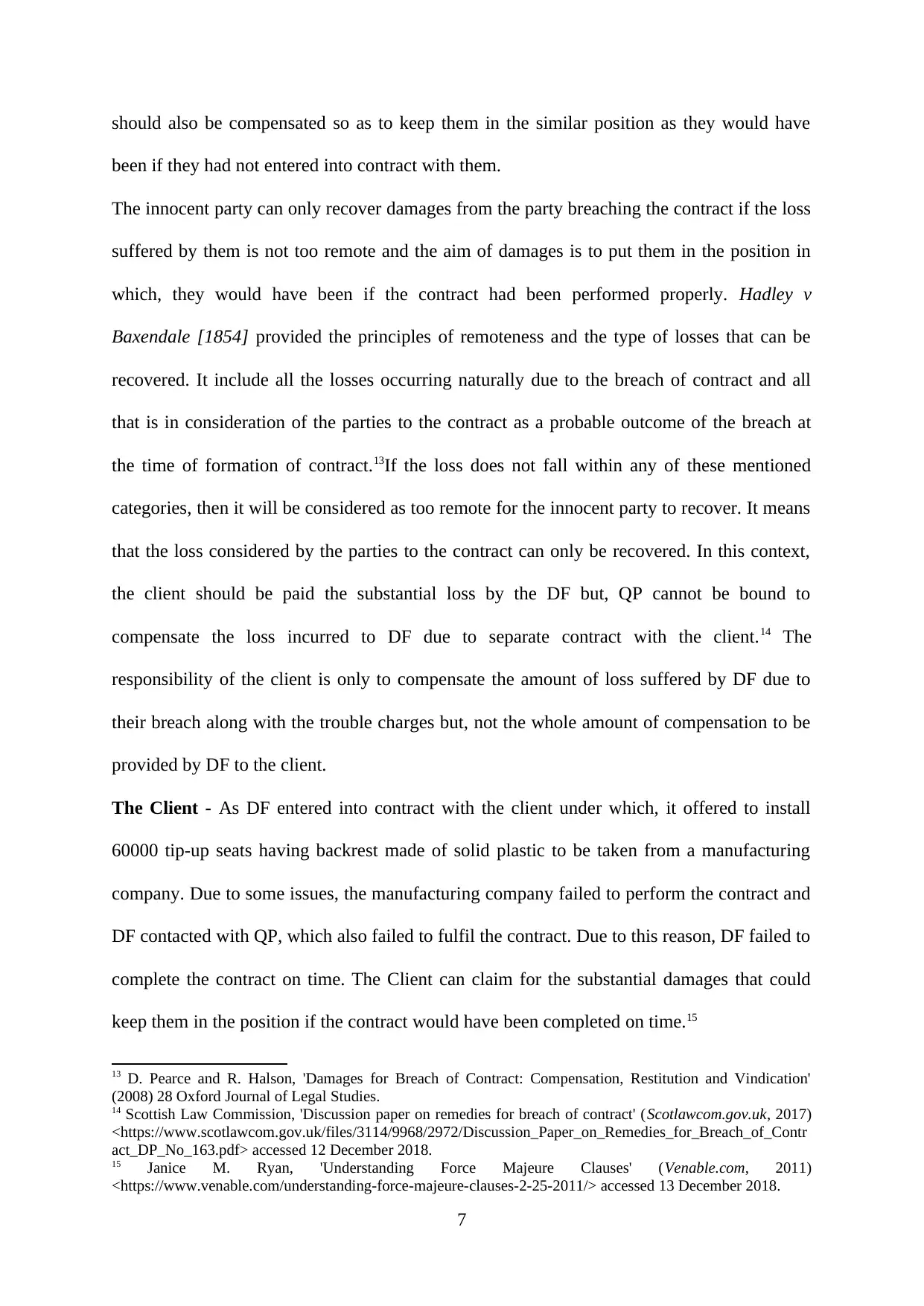
should also be compensated so as to keep them in the similar position as they would have
been if they had not entered into contract with them.
The innocent party can only recover damages from the party breaching the contract if the loss
suffered by them is not too remote and the aim of damages is to put them in the position in
which, they would have been if the contract had been performed properly. Hadley v
Baxendale [1854] provided the principles of remoteness and the type of losses that can be
recovered. It include all the losses occurring naturally due to the breach of contract and all
that is in consideration of the parties to the contract as a probable outcome of the breach at
the time of formation of contract.13If the loss does not fall within any of these mentioned
categories, then it will be considered as too remote for the innocent party to recover. It means
that the loss considered by the parties to the contract can only be recovered. In this context,
the client should be paid the substantial loss by the DF but, QP cannot be bound to
compensate the loss incurred to DF due to separate contract with the client.14 The
responsibility of the client is only to compensate the amount of loss suffered by DF due to
their breach along with the trouble charges but, not the whole amount of compensation to be
provided by DF to the client.
The Client - As DF entered into contract with the client under which, it offered to install
60000 tip-up seats having backrest made of solid plastic to be taken from a manufacturing
company. Due to some issues, the manufacturing company failed to perform the contract and
DF contacted with QP, which also failed to fulfil the contract. Due to this reason, DF failed to
complete the contract on time. The Client can claim for the substantial damages that could
keep them in the position if the contract would have been completed on time.15
13 D. Pearce and R. Halson, 'Damages for Breach of Contract: Compensation, Restitution and Vindication'
(2008) 28 Oxford Journal of Legal Studies.
14 Scottish Law Commission, 'Discussion paper on remedies for breach of contract' (Scotlawcom.gov.uk, 2017)
<https://www.scotlawcom.gov.uk/files/3114/9968/2972/Discussion_Paper_on_Remedies_for_Breach_of_Contr
act_DP_No_163.pdf> accessed 12 December 2018.
15 Janice M. Ryan, 'Understanding Force Majeure Clauses' (Venable.com, 2011)
<https://www.venable.com/understanding-force-majeure-clauses-2-25-2011/> accessed 13 December 2018.
7
been if they had not entered into contract with them.
The innocent party can only recover damages from the party breaching the contract if the loss
suffered by them is not too remote and the aim of damages is to put them in the position in
which, they would have been if the contract had been performed properly. Hadley v
Baxendale [1854] provided the principles of remoteness and the type of losses that can be
recovered. It include all the losses occurring naturally due to the breach of contract and all
that is in consideration of the parties to the contract as a probable outcome of the breach at
the time of formation of contract.13If the loss does not fall within any of these mentioned
categories, then it will be considered as too remote for the innocent party to recover. It means
that the loss considered by the parties to the contract can only be recovered. In this context,
the client should be paid the substantial loss by the DF but, QP cannot be bound to
compensate the loss incurred to DF due to separate contract with the client.14 The
responsibility of the client is only to compensate the amount of loss suffered by DF due to
their breach along with the trouble charges but, not the whole amount of compensation to be
provided by DF to the client.
The Client - As DF entered into contract with the client under which, it offered to install
60000 tip-up seats having backrest made of solid plastic to be taken from a manufacturing
company. Due to some issues, the manufacturing company failed to perform the contract and
DF contacted with QP, which also failed to fulfil the contract. Due to this reason, DF failed to
complete the contract on time. The Client can claim for the substantial damages that could
keep them in the position if the contract would have been completed on time.15
13 D. Pearce and R. Halson, 'Damages for Breach of Contract: Compensation, Restitution and Vindication'
(2008) 28 Oxford Journal of Legal Studies.
14 Scottish Law Commission, 'Discussion paper on remedies for breach of contract' (Scotlawcom.gov.uk, 2017)
<https://www.scotlawcom.gov.uk/files/3114/9968/2972/Discussion_Paper_on_Remedies_for_Breach_of_Contr
act_DP_No_163.pdf> accessed 12 December 2018.
15 Janice M. Ryan, 'Understanding Force Majeure Clauses' (Venable.com, 2011)
<https://www.venable.com/understanding-force-majeure-clauses-2-25-2011/> accessed 13 December 2018.
7
Paraphrase This Document
Need a fresh take? Get an instant paraphrase of this document with our AI Paraphraser
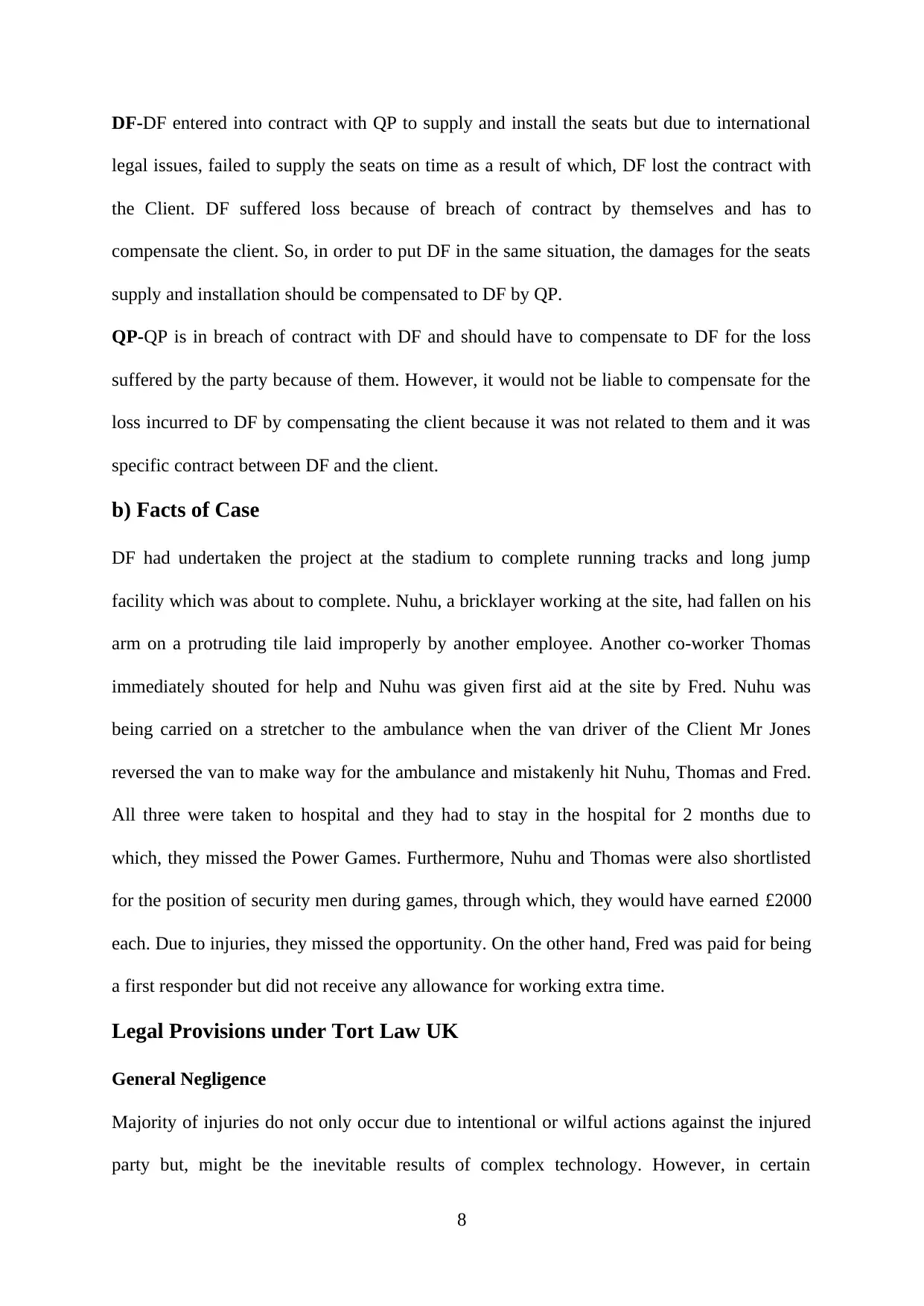
DF-DF entered into contract with QP to supply and install the seats but due to international
legal issues, failed to supply the seats on time as a result of which, DF lost the contract with
the Client. DF suffered loss because of breach of contract by themselves and has to
compensate the client. So, in order to put DF in the same situation, the damages for the seats
supply and installation should be compensated to DF by QP.
QP-QP is in breach of contract with DF and should have to compensate to DF for the loss
suffered by the party because of them. However, it would not be liable to compensate for the
loss incurred to DF by compensating the client because it was not related to them and it was
specific contract between DF and the client.
b) Facts of Case
DF had undertaken the project at the stadium to complete running tracks and long jump
facility which was about to complete. Nuhu, a bricklayer working at the site, had fallen on his
arm on a protruding tile laid improperly by another employee. Another co-worker Thomas
immediately shouted for help and Nuhu was given first aid at the site by Fred. Nuhu was
being carried on a stretcher to the ambulance when the van driver of the Client Mr Jones
reversed the van to make way for the ambulance and mistakenly hit Nuhu, Thomas and Fred.
All three were taken to hospital and they had to stay in the hospital for 2 months due to
which, they missed the Power Games. Furthermore, Nuhu and Thomas were also shortlisted
for the position of security men during games, through which, they would have earned £2000
each. Due to injuries, they missed the opportunity. On the other hand, Fred was paid for being
a first responder but did not receive any allowance for working extra time.
Legal Provisions under Tort Law UK
General Negligence
Majority of injuries do not only occur due to intentional or wilful actions against the injured
party but, might be the inevitable results of complex technology. However, in certain
8
legal issues, failed to supply the seats on time as a result of which, DF lost the contract with
the Client. DF suffered loss because of breach of contract by themselves and has to
compensate the client. So, in order to put DF in the same situation, the damages for the seats
supply and installation should be compensated to DF by QP.
QP-QP is in breach of contract with DF and should have to compensate to DF for the loss
suffered by the party because of them. However, it would not be liable to compensate for the
loss incurred to DF by compensating the client because it was not related to them and it was
specific contract between DF and the client.
b) Facts of Case
DF had undertaken the project at the stadium to complete running tracks and long jump
facility which was about to complete. Nuhu, a bricklayer working at the site, had fallen on his
arm on a protruding tile laid improperly by another employee. Another co-worker Thomas
immediately shouted for help and Nuhu was given first aid at the site by Fred. Nuhu was
being carried on a stretcher to the ambulance when the van driver of the Client Mr Jones
reversed the van to make way for the ambulance and mistakenly hit Nuhu, Thomas and Fred.
All three were taken to hospital and they had to stay in the hospital for 2 months due to
which, they missed the Power Games. Furthermore, Nuhu and Thomas were also shortlisted
for the position of security men during games, through which, they would have earned £2000
each. Due to injuries, they missed the opportunity. On the other hand, Fred was paid for being
a first responder but did not receive any allowance for working extra time.
Legal Provisions under Tort Law UK
General Negligence
Majority of injuries do not only occur due to intentional or wilful actions against the injured
party but, might be the inevitable results of complex technology. However, in certain
8
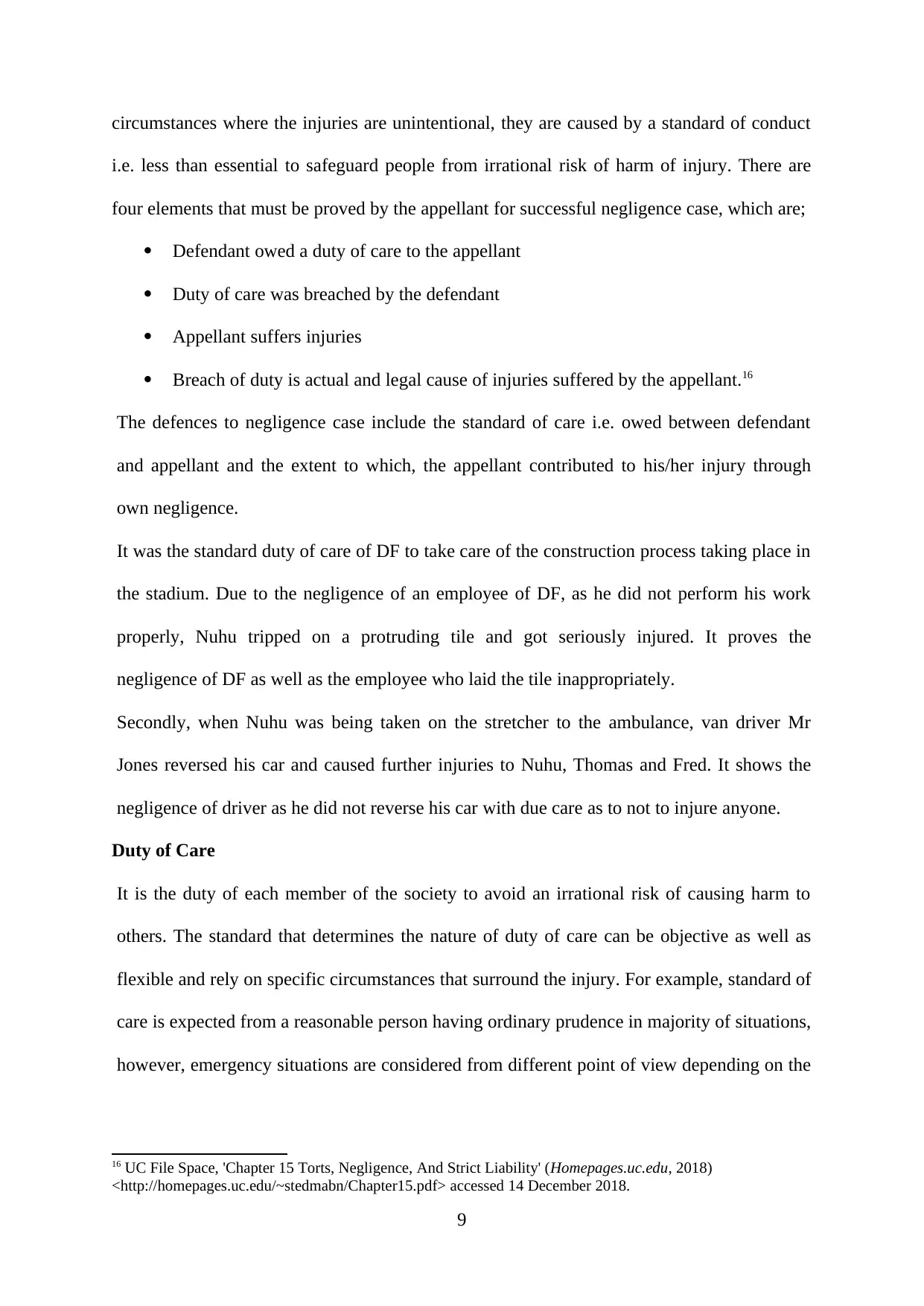
circumstances where the injuries are unintentional, they are caused by a standard of conduct
i.e. less than essential to safeguard people from irrational risk of harm of injury. There are
four elements that must be proved by the appellant for successful negligence case, which are;
Defendant owed a duty of care to the appellant
Duty of care was breached by the defendant
Appellant suffers injuries
Breach of duty is actual and legal cause of injuries suffered by the appellant.16
The defences to negligence case include the standard of care i.e. owed between defendant
and appellant and the extent to which, the appellant contributed to his/her injury through
own negligence.
It was the standard duty of care of DF to take care of the construction process taking place in
the stadium. Due to the negligence of an employee of DF, as he did not perform his work
properly, Nuhu tripped on a protruding tile and got seriously injured. It proves the
negligence of DF as well as the employee who laid the tile inappropriately.
Secondly, when Nuhu was being taken on the stretcher to the ambulance, van driver Mr
Jones reversed his car and caused further injuries to Nuhu, Thomas and Fred. It shows the
negligence of driver as he did not reverse his car with due care as to not to injure anyone.
Duty of Care
It is the duty of each member of the society to avoid an irrational risk of causing harm to
others. The standard that determines the nature of duty of care can be objective as well as
flexible and rely on specific circumstances that surround the injury. For example, standard of
care is expected from a reasonable person having ordinary prudence in majority of situations,
however, emergency situations are considered from different point of view depending on the
16 UC File Space, 'Chapter 15 Torts, Negligence, And Strict Liability' (Homepages.uc.edu, 2018)
<http://homepages.uc.edu/~stedmabn/Chapter15.pdf> accessed 14 December 2018.
9
i.e. less than essential to safeguard people from irrational risk of harm of injury. There are
four elements that must be proved by the appellant for successful negligence case, which are;
Defendant owed a duty of care to the appellant
Duty of care was breached by the defendant
Appellant suffers injuries
Breach of duty is actual and legal cause of injuries suffered by the appellant.16
The defences to negligence case include the standard of care i.e. owed between defendant
and appellant and the extent to which, the appellant contributed to his/her injury through
own negligence.
It was the standard duty of care of DF to take care of the construction process taking place in
the stadium. Due to the negligence of an employee of DF, as he did not perform his work
properly, Nuhu tripped on a protruding tile and got seriously injured. It proves the
negligence of DF as well as the employee who laid the tile inappropriately.
Secondly, when Nuhu was being taken on the stretcher to the ambulance, van driver Mr
Jones reversed his car and caused further injuries to Nuhu, Thomas and Fred. It shows the
negligence of driver as he did not reverse his car with due care as to not to injure anyone.
Duty of Care
It is the duty of each member of the society to avoid an irrational risk of causing harm to
others. The standard that determines the nature of duty of care can be objective as well as
flexible and rely on specific circumstances that surround the injury. For example, standard of
care is expected from a reasonable person having ordinary prudence in majority of situations,
however, emergency situations are considered from different point of view depending on the
16 UC File Space, 'Chapter 15 Torts, Negligence, And Strict Liability' (Homepages.uc.edu, 2018)
<http://homepages.uc.edu/~stedmabn/Chapter15.pdf> accessed 14 December 2018.
9
⊘ This is a preview!⊘
Do you want full access?
Subscribe today to unlock all pages.

Trusted by 1+ million students worldwide
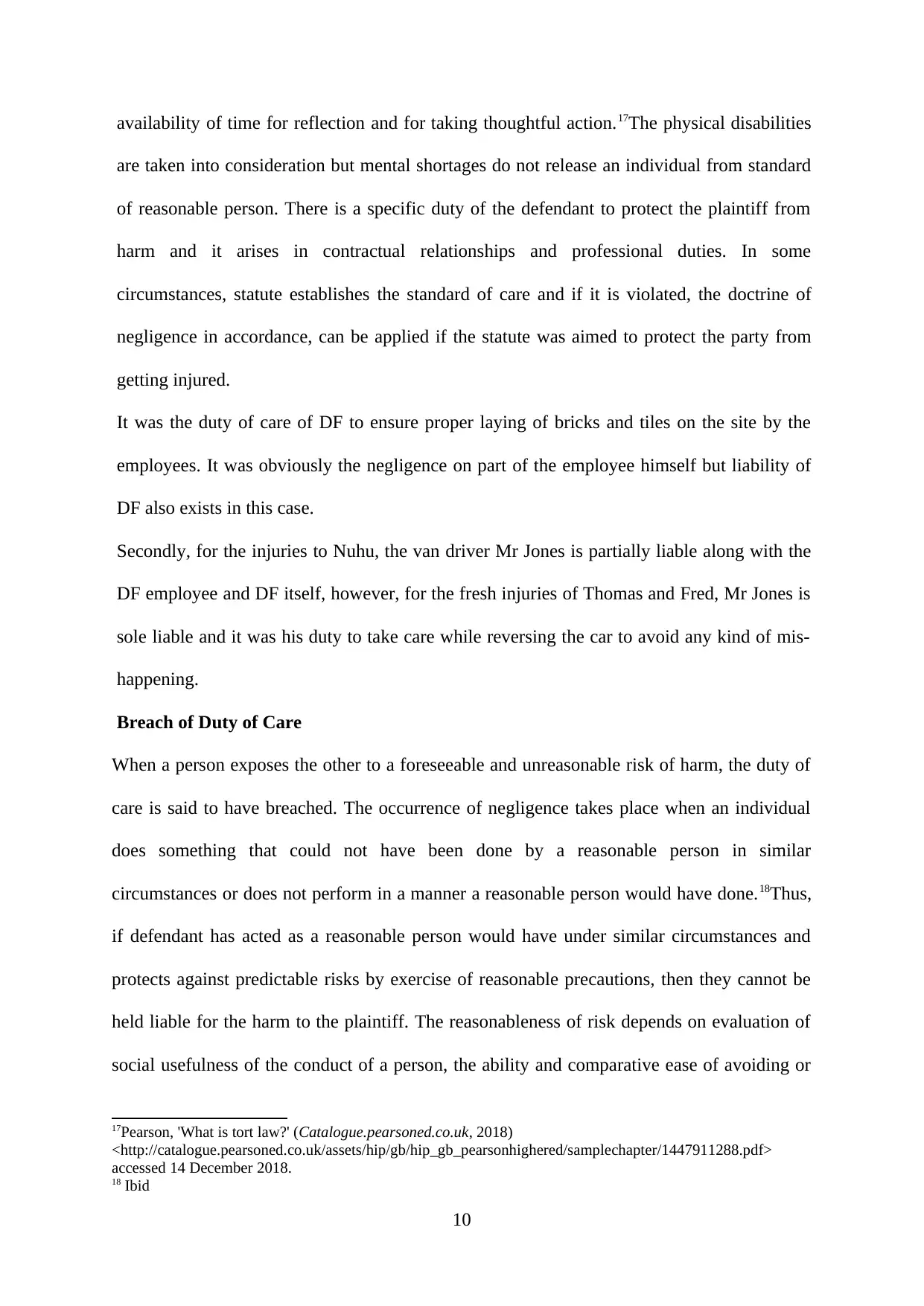
availability of time for reflection and for taking thoughtful action.17The physical disabilities
are taken into consideration but mental shortages do not release an individual from standard
of reasonable person. There is a specific duty of the defendant to protect the plaintiff from
harm and it arises in contractual relationships and professional duties. In some
circumstances, statute establishes the standard of care and if it is violated, the doctrine of
negligence in accordance, can be applied if the statute was aimed to protect the party from
getting injured.
It was the duty of care of DF to ensure proper laying of bricks and tiles on the site by the
employees. It was obviously the negligence on part of the employee himself but liability of
DF also exists in this case.
Secondly, for the injuries to Nuhu, the van driver Mr Jones is partially liable along with the
DF employee and DF itself, however, for the fresh injuries of Thomas and Fred, Mr Jones is
sole liable and it was his duty to take care while reversing the car to avoid any kind of mis-
happening.
Breach of Duty of Care
When a person exposes the other to a foreseeable and unreasonable risk of harm, the duty of
care is said to have breached. The occurrence of negligence takes place when an individual
does something that could not have been done by a reasonable person in similar
circumstances or does not perform in a manner a reasonable person would have done.18Thus,
if defendant has acted as a reasonable person would have under similar circumstances and
protects against predictable risks by exercise of reasonable precautions, then they cannot be
held liable for the harm to the plaintiff. The reasonableness of risk depends on evaluation of
social usefulness of the conduct of a person, the ability and comparative ease of avoiding or
17Pearson, 'What is tort law?' (Catalogue.pearsoned.co.uk, 2018)
<http://catalogue.pearsoned.co.uk/assets/hip/gb/hip_gb_pearsonhighered/samplechapter/1447911288.pdf>
accessed 14 December 2018.
18 Ibid
10
are taken into consideration but mental shortages do not release an individual from standard
of reasonable person. There is a specific duty of the defendant to protect the plaintiff from
harm and it arises in contractual relationships and professional duties. In some
circumstances, statute establishes the standard of care and if it is violated, the doctrine of
negligence in accordance, can be applied if the statute was aimed to protect the party from
getting injured.
It was the duty of care of DF to ensure proper laying of bricks and tiles on the site by the
employees. It was obviously the negligence on part of the employee himself but liability of
DF also exists in this case.
Secondly, for the injuries to Nuhu, the van driver Mr Jones is partially liable along with the
DF employee and DF itself, however, for the fresh injuries of Thomas and Fred, Mr Jones is
sole liable and it was his duty to take care while reversing the car to avoid any kind of mis-
happening.
Breach of Duty of Care
When a person exposes the other to a foreseeable and unreasonable risk of harm, the duty of
care is said to have breached. The occurrence of negligence takes place when an individual
does something that could not have been done by a reasonable person in similar
circumstances or does not perform in a manner a reasonable person would have done.18Thus,
if defendant has acted as a reasonable person would have under similar circumstances and
protects against predictable risks by exercise of reasonable precautions, then they cannot be
held liable for the harm to the plaintiff. The reasonableness of risk depends on evaluation of
social usefulness of the conduct of a person, the ability and comparative ease of avoiding or
17Pearson, 'What is tort law?' (Catalogue.pearsoned.co.uk, 2018)
<http://catalogue.pearsoned.co.uk/assets/hip/gb/hip_gb_pearsonhighered/samplechapter/1447911288.pdf>
accessed 14 December 2018.
18 Ibid
10
Paraphrase This Document
Need a fresh take? Get an instant paraphrase of this document with our AI Paraphraser
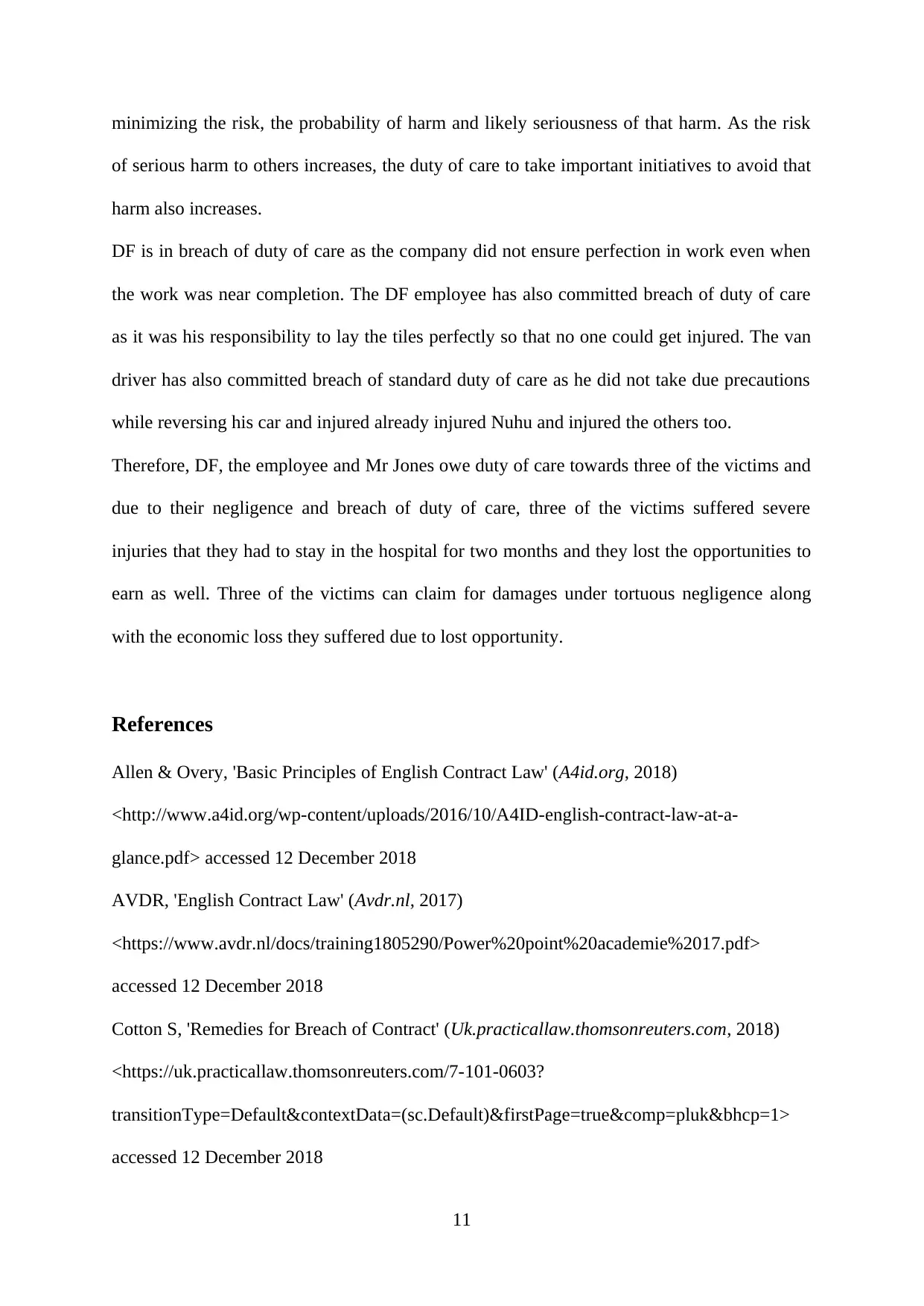
minimizing the risk, the probability of harm and likely seriousness of that harm. As the risk
of serious harm to others increases, the duty of care to take important initiatives to avoid that
harm also increases.
DF is in breach of duty of care as the company did not ensure perfection in work even when
the work was near completion. The DF employee has also committed breach of duty of care
as it was his responsibility to lay the tiles perfectly so that no one could get injured. The van
driver has also committed breach of standard duty of care as he did not take due precautions
while reversing his car and injured already injured Nuhu and injured the others too.
Therefore, DF, the employee and Mr Jones owe duty of care towards three of the victims and
due to their negligence and breach of duty of care, three of the victims suffered severe
injuries that they had to stay in the hospital for two months and they lost the opportunities to
earn as well. Three of the victims can claim for damages under tortuous negligence along
with the economic loss they suffered due to lost opportunity.
References
Allen & Overy, 'Basic Principles of English Contract Law' (A4id.org, 2018)
<http://www.a4id.org/wp-content/uploads/2016/10/A4ID-english-contract-law-at-a-
glance.pdf> accessed 12 December 2018
AVDR, 'English Contract Law' (Avdr.nl, 2017)
<https://www.avdr.nl/docs/training1805290/Power%20point%20academie%2017.pdf>
accessed 12 December 2018
Cotton S, 'Remedies for Breach of Contract' (Uk.practicallaw.thomsonreuters.com, 2018)
<https://uk.practicallaw.thomsonreuters.com/7-101-0603?
transitionType=Default&contextData=(sc.Default)&firstPage=true&comp=pluk&bhcp=1>
accessed 12 December 2018
11
of serious harm to others increases, the duty of care to take important initiatives to avoid that
harm also increases.
DF is in breach of duty of care as the company did not ensure perfection in work even when
the work was near completion. The DF employee has also committed breach of duty of care
as it was his responsibility to lay the tiles perfectly so that no one could get injured. The van
driver has also committed breach of standard duty of care as he did not take due precautions
while reversing his car and injured already injured Nuhu and injured the others too.
Therefore, DF, the employee and Mr Jones owe duty of care towards three of the victims and
due to their negligence and breach of duty of care, three of the victims suffered severe
injuries that they had to stay in the hospital for two months and they lost the opportunities to
earn as well. Three of the victims can claim for damages under tortuous negligence along
with the economic loss they suffered due to lost opportunity.
References
Allen & Overy, 'Basic Principles of English Contract Law' (A4id.org, 2018)
<http://www.a4id.org/wp-content/uploads/2016/10/A4ID-english-contract-law-at-a-
glance.pdf> accessed 12 December 2018
AVDR, 'English Contract Law' (Avdr.nl, 2017)
<https://www.avdr.nl/docs/training1805290/Power%20point%20academie%2017.pdf>
accessed 12 December 2018
Cotton S, 'Remedies for Breach of Contract' (Uk.practicallaw.thomsonreuters.com, 2018)
<https://uk.practicallaw.thomsonreuters.com/7-101-0603?
transitionType=Default&contextData=(sc.Default)&firstPage=true&comp=pluk&bhcp=1>
accessed 12 December 2018
11
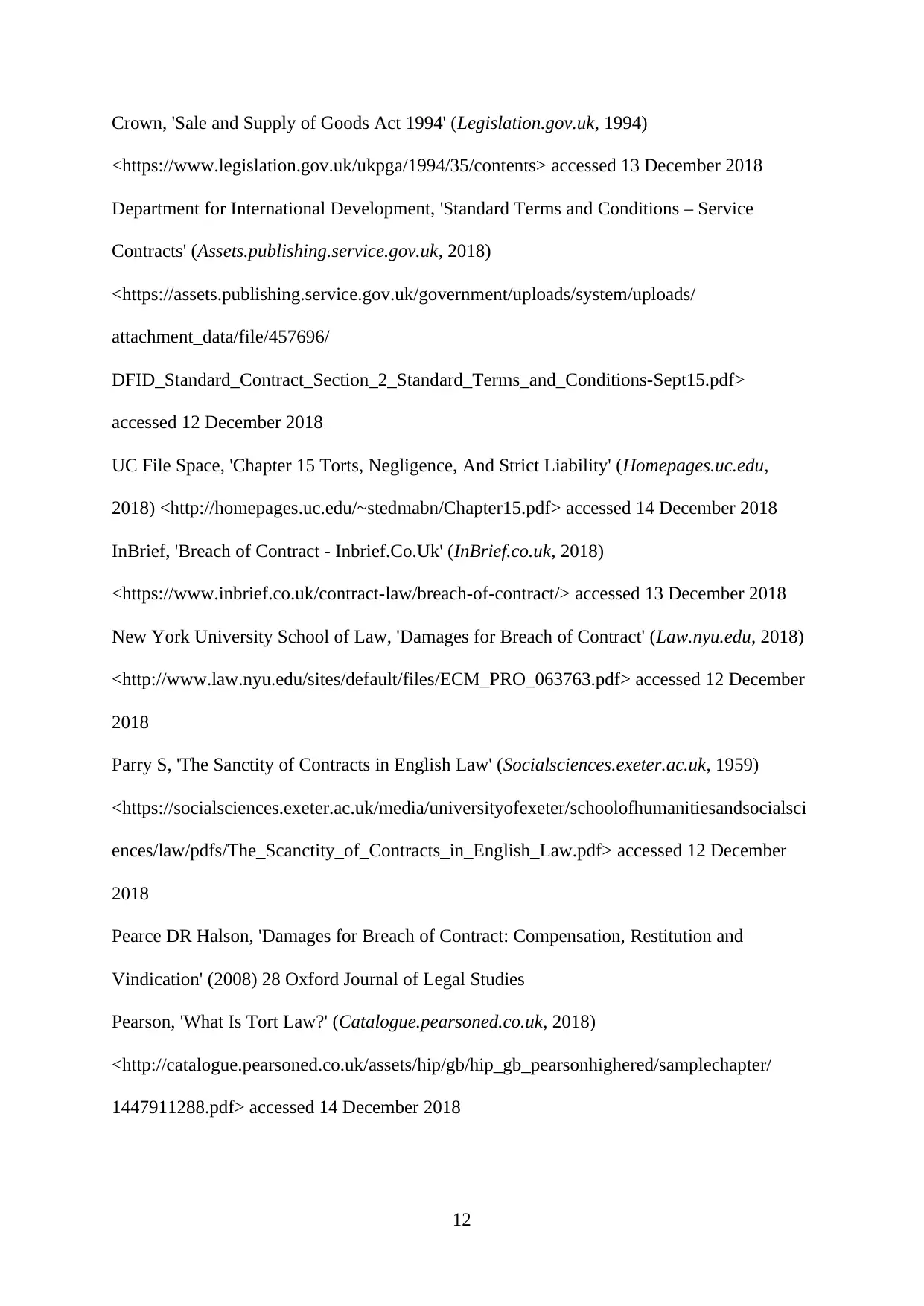
Crown, 'Sale and Supply of Goods Act 1994' (Legislation.gov.uk, 1994)
<https://www.legislation.gov.uk/ukpga/1994/35/contents> accessed 13 December 2018
Department for International Development, 'Standard Terms and Conditions – Service
Contracts' (Assets.publishing.service.gov.uk, 2018)
<https://assets.publishing.service.gov.uk/government/uploads/system/uploads/
attachment_data/file/457696/
DFID_Standard_Contract_Section_2_Standard_Terms_and_Conditions-Sept15.pdf>
accessed 12 December 2018
UC File Space, 'Chapter 15 Torts, Negligence, And Strict Liability' (Homepages.uc.edu,
2018) <http://homepages.uc.edu/~stedmabn/Chapter15.pdf> accessed 14 December 2018
InBrief, 'Breach of Contract - Inbrief.Co.Uk' (InBrief.co.uk, 2018)
<https://www.inbrief.co.uk/contract-law/breach-of-contract/> accessed 13 December 2018
New York University School of Law, 'Damages for Breach of Contract' (Law.nyu.edu, 2018)
<http://www.law.nyu.edu/sites/default/files/ECM_PRO_063763.pdf> accessed 12 December
2018
Parry S, 'The Sanctity of Contracts in English Law' (Socialsciences.exeter.ac.uk, 1959)
<https://socialsciences.exeter.ac.uk/media/universityofexeter/schoolofhumanitiesandsocialsci
ences/law/pdfs/The_Scanctity_of_Contracts_in_English_Law.pdf> accessed 12 December
2018
Pearce DR Halson, 'Damages for Breach of Contract: Compensation, Restitution and
Vindication' (2008) 28 Oxford Journal of Legal Studies
Pearson, 'What Is Tort Law?' (Catalogue.pearsoned.co.uk, 2018)
<http://catalogue.pearsoned.co.uk/assets/hip/gb/hip_gb_pearsonhighered/samplechapter/
1447911288.pdf> accessed 14 December 2018
12
<https://www.legislation.gov.uk/ukpga/1994/35/contents> accessed 13 December 2018
Department for International Development, 'Standard Terms and Conditions – Service
Contracts' (Assets.publishing.service.gov.uk, 2018)
<https://assets.publishing.service.gov.uk/government/uploads/system/uploads/
attachment_data/file/457696/
DFID_Standard_Contract_Section_2_Standard_Terms_and_Conditions-Sept15.pdf>
accessed 12 December 2018
UC File Space, 'Chapter 15 Torts, Negligence, And Strict Liability' (Homepages.uc.edu,
2018) <http://homepages.uc.edu/~stedmabn/Chapter15.pdf> accessed 14 December 2018
InBrief, 'Breach of Contract - Inbrief.Co.Uk' (InBrief.co.uk, 2018)
<https://www.inbrief.co.uk/contract-law/breach-of-contract/> accessed 13 December 2018
New York University School of Law, 'Damages for Breach of Contract' (Law.nyu.edu, 2018)
<http://www.law.nyu.edu/sites/default/files/ECM_PRO_063763.pdf> accessed 12 December
2018
Parry S, 'The Sanctity of Contracts in English Law' (Socialsciences.exeter.ac.uk, 1959)
<https://socialsciences.exeter.ac.uk/media/universityofexeter/schoolofhumanitiesandsocialsci
ences/law/pdfs/The_Scanctity_of_Contracts_in_English_Law.pdf> accessed 12 December
2018
Pearce DR Halson, 'Damages for Breach of Contract: Compensation, Restitution and
Vindication' (2008) 28 Oxford Journal of Legal Studies
Pearson, 'What Is Tort Law?' (Catalogue.pearsoned.co.uk, 2018)
<http://catalogue.pearsoned.co.uk/assets/hip/gb/hip_gb_pearsonhighered/samplechapter/
1447911288.pdf> accessed 14 December 2018
12
⊘ This is a preview!⊘
Do you want full access?
Subscribe today to unlock all pages.

Trusted by 1+ million students worldwide
1 out of 13
Your All-in-One AI-Powered Toolkit for Academic Success.
+13062052269
info@desklib.com
Available 24*7 on WhatsApp / Email
![[object Object]](/_next/static/media/star-bottom.7253800d.svg)
Unlock your academic potential
Copyright © 2020–2026 A2Z Services. All Rights Reserved. Developed and managed by ZUCOL.